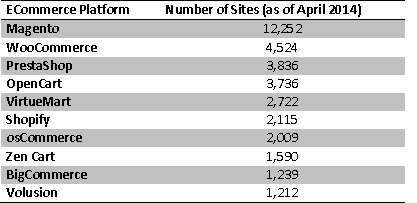Have you been keeping track of the leading eCommerce platforms that have emerged in recent years for businesses?

If yes, then Magento is sure to figure in that list of popular eCommerce solutions that have made lives easier for businesses to go online with their products or services.
Magento has been known to help businesses seamlessly build an online store across any category, customise it as per their changing needs, attract more customers and generate better sales.
This open source Content Management System (CMS) has been constantly evolving with new solutions and tools, due to which it has been trusted and utilised by more than 240,000 businesses across the globe.
This number is estimated to rise by leaps and bounds in the coming years as the demand for eCommerce increases.
So let’s check out the advantages offered by Magento, especially for small businesses, and compare it to other eCommerce platforms or CMSs.
1. A Customisable Open Source Solution
Magento (Community Edition) is open source and can be downloaded for free. Once installed, you are not restricted to the standard templates, but you can customise it as per the dynamic requirements of your business.

Image credit: Flickr
You can boost your eCommerce store with several new features and functionalities by installing Magento extensions that are available at the Magento Connect marketplace.
For small businesses, this customising option is pretty handy since the eCommerce needs of these businesses may be pretty specific.
2. Strong Community Support
To enjoy a smooth experience with any new tool or CMS, like Magento, that you haven’t used before, you will always feel the need to have reliable and readily available support.

Since Magento is open source, it has an extremely large and knowledgeable community of developers who constantly work on it to ensure it stays updated and secure. If you are stuck anywhere or face any issues while handling the Magento tool, sound technical help is available to you at an instant.
Such support is ideal for small businesses which may not always have enough expertise with Magento to handle the issues. They can easily rely on this Magento community support to get solutions for several issues.
Most of the problems that you may face, while using Magento for the first time, may already have been discussed with solutions at the community forum sites.
3. One-Stop Shop
The best thing about Magento is that you can manage it from a single platform and do not need different solutions for different purposes.

Image credit: Flickr
You can manage all customer records, billing activities, store inventory, and so on from one place (the admin dashboard). You can create multiple online stores from a single backend CMS.
All your eCommerce apps can be handled from a single database, which further increases your company’s efficiency. This makes it easier for small businesses, as they will need fewer resources to manage and monitor their online store.
4. Support for Mobile Shopping Experience
The world is witnessing an increasing trend towards online shopping for mobile phones. This has led many eCommerce businesses to switch their focus towards developing their online store apps or making their eCommerce websites mobile friendly.

The fact that the Magento platform offers multiple HTML5 capabilities ensures that your customers will have a superior mobile shopping experience.
5. Higher Flexibility and Scalability
With an open system architecture, the Magento experts in your company can create uniquely designed user experiences for various types of access devices.
You can have a fully flexible eCommerce workflow to meet the different business requirements of your company. In addition, this platform offers a higher scalability option at any point of time.
This means that your business can grow seamlessly with flexible eCommerce-based modifications and enhancements possible through Magento.
Comparison with Other Popular CMS
If you were asked about the most popular CMS in the world today, you would probably answer “WordPress”. There is no doubt about the overall popularity of WordPress, but it is not designed specifically for eCommerce.
To handle eCommerce requirements, you need to use WooCommerce along with WordPress. Similarly, if you want to design eCommerce stores using another popular CMS, like Drupal, you need to use Drupal Commerce along with it.
Yet, Magento is a platform specifically created for eCommerce requirements. It possesses countless eCommerce features and functionalities that give it a clear edge over other content management systems supporting eCommerce.
Magento is quite SEO friendly and you get the preloaded ability to give meta titles and descriptions as soon as you add products to your online store. You don’t need to install a separate SEO extension or plugin. Some other preloaded SEO features include sitemaps, URL rewrites and layered navigation.
For WordPress, you need to specifically download an SEO plugin, like Yoast, for SEO-related features.
A simple comparison table according to a Tomrobertshaw.net report , for the top eCommerce software in use across the globe is illustrated below:

It is clear that Magento leads the way for eCommerce software with a market share of almost 26%, followed by WooCommerce which is way behind with only 9.7% of the market share.
Now that you know Magento is the best eCommerce platform currently, you may be wondering about the ways through which you can opt for a suitable Magento development service provider.
You can do that by checking out the Magento community forums which are full of experienced Magento developers or you can find a suitable one via LinkedIn or Crunchbase as well.
You can also check out who has extensive experience in developing online stores using Magento and contact them to get the relevant services for your business.
So, what are you waiting for? Get started with Magento and grow your online business!

Written by Tanya Kumari
Tanya leads the Digital Marketing Team at Classic Informatics, a leading web development company . She is an avid reader, music lover and a technology enthusiast who likes to be up to date with all the latest advancements happening in the techno world. When she is not working on her latest article on agile team dynamics, you can find her by the coffee machine, briefing co-workers on the perks of living a healthy lifestyle and how to achieve it.








.png)











